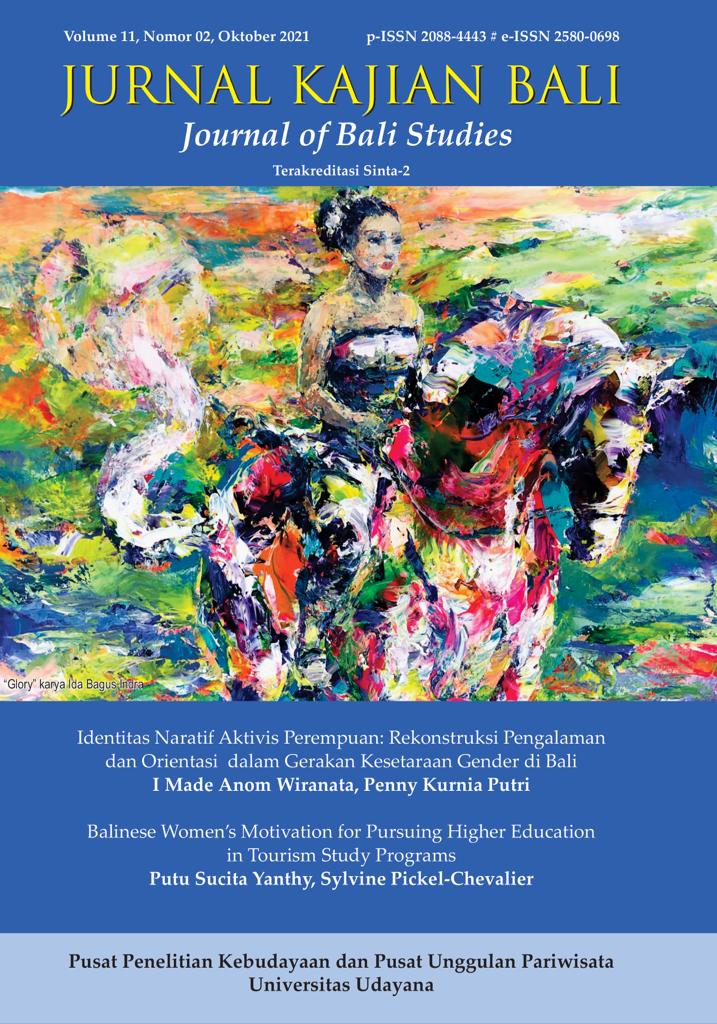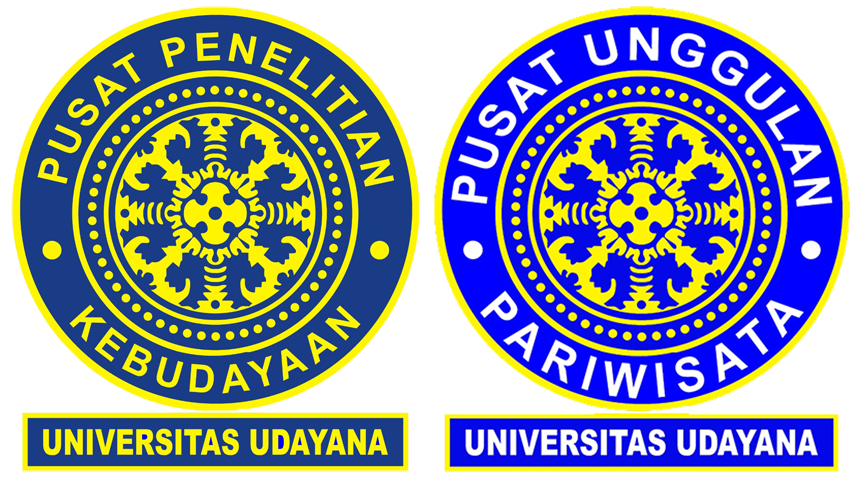Yoga as Ethics of Self-Transformation in the Sivagama Text
Abstract
This paper attempts to reveal yoga as an ethics of self-transformation in the ?iv?gama text of Ida Pêdanda Madé Sidêmên (1858–1984). As yoga pervades Balinese textual tradition, adaptation and development of teachings in the Indonesian archipelago show the creativity of the indigenous people. The ?iv?gama was analyzed via textual studies with data categorized to foreground concepts of yoga. The s?rgah (canto) 15, in particular, introduces various forms of yoga and sam?dhi for purifying body and mind. Each section describes how to perform a specific yoga, the attributes of the associated deity, and the benefit that can be reaped by the practice. One finding is that the cosmic function from a yogic perspective in the ?iv?gama text differs from the views of Upani?adic texts. The summaries from this study hope to contribute to efforts to understand the teachings of yoga that are available in Sanskrit-Old Javanese literature.
Downloads
References
Agastia, I.B.G. (1994). Ida Pedanda Made Sidemen Pengarang Besar Bali Abad ke-20. Denpasar: Yayasan Dharma Sastra.
Agastia, I.B.G. (2010). Yoga Sastra. Denpasar: Yayasan Dharma Sastra.
Bagus, I G.N.B., I M. Suastika, I M. Seraya, and I N. Sulaga. (1988). Analisis dan Kajian Geguritan Salampah Laku Karya Ida Pedanda Made Sidemen. Jakarta: Departemen Pendidikan dan Kebudayaan.
Deslippe, P. (2008). The swami circuit: mapping the terrain of early American yoga. Journal of Yoga Studies. 2018 (1), 5 – 44. Retrieved 12 December 2020 from https://journalofyogastudies.org/index.php/JoYS/article/view/2018.v1.Deslippe.TheSwamiCircuit/2018.v1.Deslippe.TheSwamiCircuit
Ginarsa, I.K., I.W. Selamet, and N.N. Putrini. (1985). Siwagama oleh Ida Pedanda Made Sidemen (transliterasi). Jakarta: Departemen Pendidikan dan Kebudayaan.
Grimes, J. (2009). A Concise Dictionary of Indian Philosophy: Sanskrit Terms Defined in English. Varanasi: Indica Books.
Iyengar, B.K.S. (1993). Light on the Yoga Sutra of Patanjali. London: HerperCollins Publisher.
Iyengar, B.K.S. (2008). Light on Astangga Yoga. Delhi: Alchemy Publishers.
Mallinson, J. and M. Singleton. (2017). Roots of Yoga. London: Penguin Books.
Panani, S.Y.P. (2019). Serat Wulangreh: ajaran keutamaan moral membangun pribadi yang luhur. Jurnal Filsafat, 29 (2), Retrieved 12 December 2020 from https://jurnal.ugm.ac.id/wisdom/about/
Powel, S. (2014). Etched in stone: sixteenth-century visual and material evidence of Śaiva ascetics and yogis in complex non-seated āsanas at Vijayanagar. Journal of Yoga Studies. 2018 (1). 45-106. Retrieved 12 December 2020 from https://journalofyogastudies.org/index.php/JoYS/article/view/2018.v1.Powell.EtchedinStone/3.
Rubinstein, R. (1996). Colophons as a tool for mapping the literary history of Bali: Ida Pedanda Made Sidemen-poet, author and scriber. Archipel 52, 173-191.
Stephen, M. (2010). The yogic art of dying, Kundalinī yoga, and the Balinese pitra yadnya. Bijdragen tot de Taal-, Land- en Volkenkunde 166 (4), 426-474. Retrieved 12 December 2020 from http://www.kitlv-journals.nl/index.php/btlv.
Stephen, M. (2014). The dasaksara and yoga in Bali. The Journal of Hindu Studies, 7 (2), 179-216. Retrieved 12 December 2020 from https://doi.org/10.1093/jhs/hiu023
Rai, Ram Kumar. (2012). Encyclopedia of Yoga. Varanasi: Prachya Prakashan.
Sedyawti, Edy, I. K. Wiryamartana, S.D. Damono, and S. S. Adiwimarta (eds.). (2001). Sastra Jawa Suatu Tinjauan Umum. Jakarta: Balai Pustaka.
Suamba, I.B.P. (2015). Yoga Sutra Patanjali: Terjemahan Sanskerta-Indonesia. Denpasar : Widya Dharma.
Suamba, I.B.P. (2016a). Nawanatya sebagai ajaran kepemimpinan: Membaca teks Siwagama karya Ida Pedanda Made Sidemen (paper). Presented for the 6th Parum Param organized by the Cultural Directorate of the City of Denpasar Government, 19th September at Bali Hotel, Denpasar, Bali.
Suamba, I.B.P. (2016b). Memahami ‘karangawak’ Ida Pedanda Made Sidemen (paper). Presented for Rembug Sastra Purnama Bhadrawada, 19 June at Pura Jagatnatha Denpasar, Bali.
Suamba, I.B.P. (2016c). Biografi Ida Pedanda Made Sidemen, Pengarang-Pendeta Bali. Denpasar: Dinas Kebudayaan Pemerintah Kota Denpasar in cooperation with Program Pasca Sarjana Universitas Hindu Indonesia.
Suamba, I.B.P. (2016d). Javanese-Saivism: A Philosophical Study of Tattva Texts. Delhi: B.R. Publishing Corporation.
Suamba, I.B.P. (2020). Ethics of leadership in the Sivagama text. Jurnal Kajian Bali, 20 (2), 375-394. Retrieved 12 December 2020 from https://ojs.unud.ac.id/index.php/kajianbali/issue/view/3661
Suarka, I. N. (2005). Kajian Naskah Lontar Siwagama, Vol. 2. Denpasar: Dinas Kebudayaan Provinsi Bali.
Woodyard, C. (2011). Exploring the therapeutic effects of yoga and its ability to increase quality of life. Int J Yoga. 4(2), 49–54. Retrieved 12 December 2020 from https://www.ncbi.nlm.nih.gov/pmc/articles/PMC3193654/

This work is licensed under a Creative Commons Attribution 4.0 International License.



















